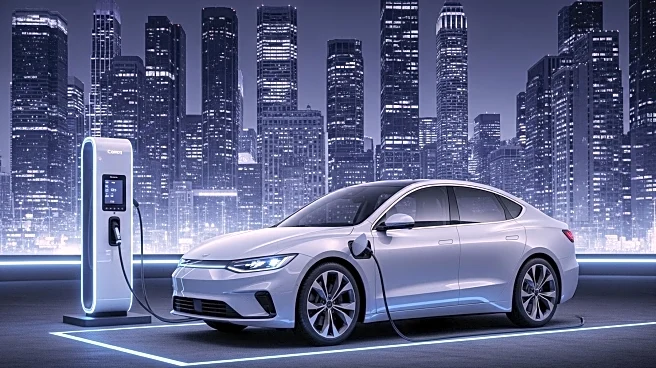What's Happening?
Chevrolet has reported a significant increase in electric vehicle (EV) sales, with a growth of 86.2% in the third quarter compared to the same period last year. The brand sold 37,114 EVs, up from 19,933 in the third quarter of 2024. This surge is attributed to the popularity of models like the Equinox EV, which saw a 156.7% increase in sales, and the Silverado EV, which nearly doubled its sales year-over-year. The growth comes amidst changes in federal EV tax credits, which have influenced consumer purchasing behavior. Despite the increase, EVs still represent only 8.1% of Chevrolet's total sales, indicating room for further growth.
Why It's Important?
The rise in Chevrolet's EV sales reflects broader trends in the automotive industry towards electrification and sustainability. As consumers increasingly opt for electric vehicles, manufacturers are compelled to expand their EV offerings and improve infrastructure to support this shift. The growth in EV sales is crucial for reducing carbon emissions and achieving environmental goals. It also highlights the impact of policy changes, such as the alteration of federal tax credits, on consumer behavior and market dynamics. Chevrolet's success in increasing EV sales positions it as a competitive player in the evolving automotive landscape, potentially influencing other manufacturers to accelerate their electrification efforts.
What's Next?
Chevrolet's continued focus on expanding its EV lineup and improving sales figures will likely drive further innovation and investment in electric vehicle technology. The company may explore new models and technologies to capture a larger share of the EV market. As the industry adapts to changing consumer preferences and regulatory environments, Chevrolet's strategies could influence market trends and encourage other automakers to enhance their EV offerings. The remainder of the year will be crucial for assessing the long-term impact of these sales figures and determining future directions for Chevrolet and the broader automotive industry.
Beyond the Headlines
The increase in Chevrolet's EV sales underscores the ethical and environmental considerations driving the automotive industry. As manufacturers prioritize sustainability, they contribute to global efforts to combat climate change and reduce reliance on fossil fuels. The shift towards electric vehicles also reflects changing cultural attitudes towards transportation, with consumers increasingly valuing eco-friendly options. This trend may lead to broader societal changes, including shifts in urban planning and infrastructure development to accommodate electric vehicles. The long-term implications could include a transformation in how communities approach mobility and environmental responsibility.









